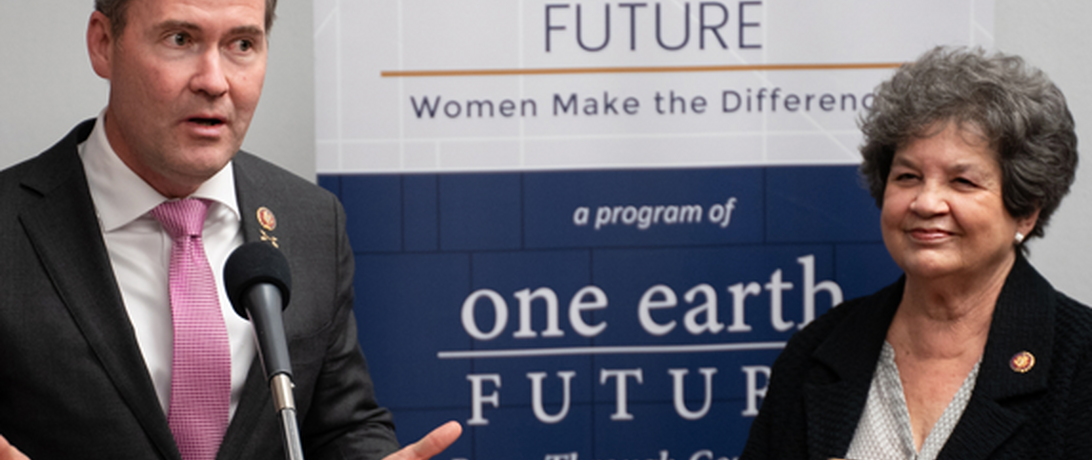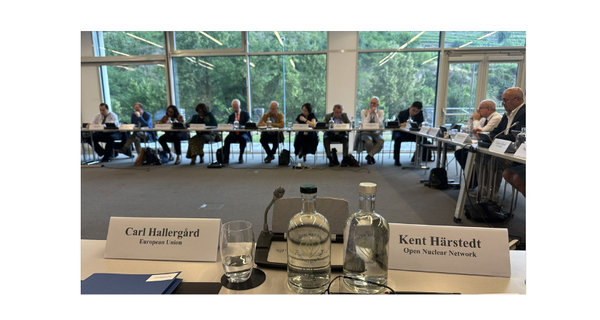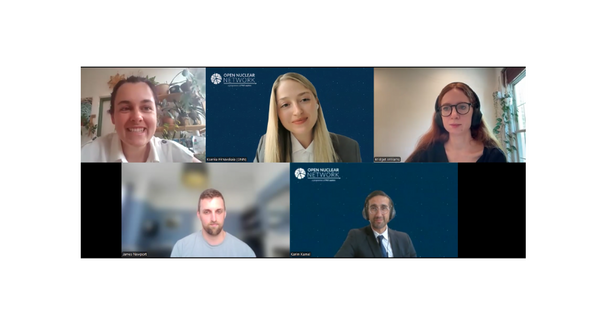
Not just this month, as the world celebrates Women’s History Month and International Women’s Day, One Earth Future Foundation continually prioritizes efforts to ensure that gender perspectives are taken into account in peace and security decision-making processes. While that shows up in all our programming around the world, we’re always proud to highlight the critical importance of the work that OEF’s Our Secure Future program is doing to advance the international Women, Peace and Security agenda (WPS).
The Women, Peace and Security agenda focuses on human security for all and promotes responses to crises that take into account differing experiences and needs among the population. Preventing, managing and resolving violent political crises and complex emergencies require skills and contributions from all members of society. Conflict, post-conflict and disaster situations, have different impacts on women, men, girls, and boys. Solving these problems requires policy responses that integrate an understanding of these varying experiences, needs, priorities, and values.
The promotion of active, meaningful roles for women in all aspects and levels of their communities advances inclusivity, democracy, and long-term stability within societies. There are mountains of empirical evidence suggesting that women’s participation makes security policies, programs, and outcomes more effective. In the United States, these policy goals are enshrined in the Women, Peace and Security Act (Public Law 115-68 passed in 2017), and globally they are articulated in UN Security Council Resolution 1325.
OEF has an enduring commitment to advancing women’s rights in matters of international peace and security because we know it works. That’s why we believe so strongly in the work of our Our Secure Future program team and their partners and allies.
There are key actions that can be taken to move the WPS agenda from theory to a series of concrete actions that creates sustainable peace. For example, OEF’s “Some Credible Evidence” report found strong indications that Women, Peace and Security works. These WPS interventions met the criteria for successfully delivering the conditions identified as necessary for peace:
- Improving education and increasing women’s engagement in economic and political life as preventive measures
- Increasing women’s participation in peace negotiations as peacemaking measures.
As the global agenda on Women, Peace and Security is increasingly implemented, the transformational role of women as direct actors in issues of peace and security is becoming more obvious. Based on our research, Women’s Participation and the Fate of Non-Violent Campaigns, gender-inclusive movements may be better at building and wielding genuine political and social power to create change.
This is certainly true in the case of formal institutions, where women are increasingly represented in higher positions internationally. It is also true in less formal or official domains: women have been at the forefront of civil resistance movements throughout history, and they have been visible leaders in contemporary nonviolent resistance movements from Sudan to Algeria and beyond.
With WPS as one of OEF’s core pillars, Our Secure Future is spearheading the charge to advance the Women, Peace and Security agenda by ensuring that using a gender perspective in security becomes standard practice by decision-makers and that actors are held accountable for implementing the policies. Some of our work includes:
Women, Peace and Security (WPS) Congressional Caucus: Our Secure Future has spearheaded the establishment of a bipartisan Women, Peace and Security (WPS) Congressional Caucus. OSF provides support to the congressional platform to:
- Raise awareness on issues related to WPS priorities;
- Educate the public and Members of Congress on WPS policy initiatives;
- Exercise Congressional oversight of the implementation of the WPS National Strategy;
- Explore WPS issues related to specific conflicts around the world.
National Action Plans: Our Secure Future also collaborates with civil society and other actors to provide consultation and National Action Plans for WPS. Civil society consultation is a key part of drafting the documents, and civil society actors are crucial in monitoring implementation by government actors and ensuring accountability for the commitments made. The goal is to produce meaningful advancement in the WPS agenda at the national and local level, with a focus on supporting specific programs, practices, and policies that promote their inclusion.
Thought Leadership and Research: Our Secure Future’s partners, fellows, and Director Sahana Dharmapuri work through publications and cutting-edge research in WPS and advocacy to ensure oversight that holds security actors accountable to legal commitments. Our Secure Future also provides critical thought leadership on geopolitical issues regarding Women, Peace and Security.
Mobilizing Men as Critical Partners: OSF is bringing global leaders—including prominent men from the defense, diplomacy, development, and business arenas—more fully into the campaign, along with the courageous women leaders who have long driven this advocacy, including grassroots advocates from war-affected countries.
_____
In this final article of our three-part series, Incubating Peace, spotlighting the core areas of One Earth Future’s three core areas of program focus, the authors focus on how important the role of women is to fostering environments for long-term peace. In January 2022 Jon focused on programs building livelihoods and markets to build lasting peace, and in February he highlighted our work on innovating negotiation strategies for peace
Article Details
Published
Written by
Program
Content Type
Opinion & Insights

